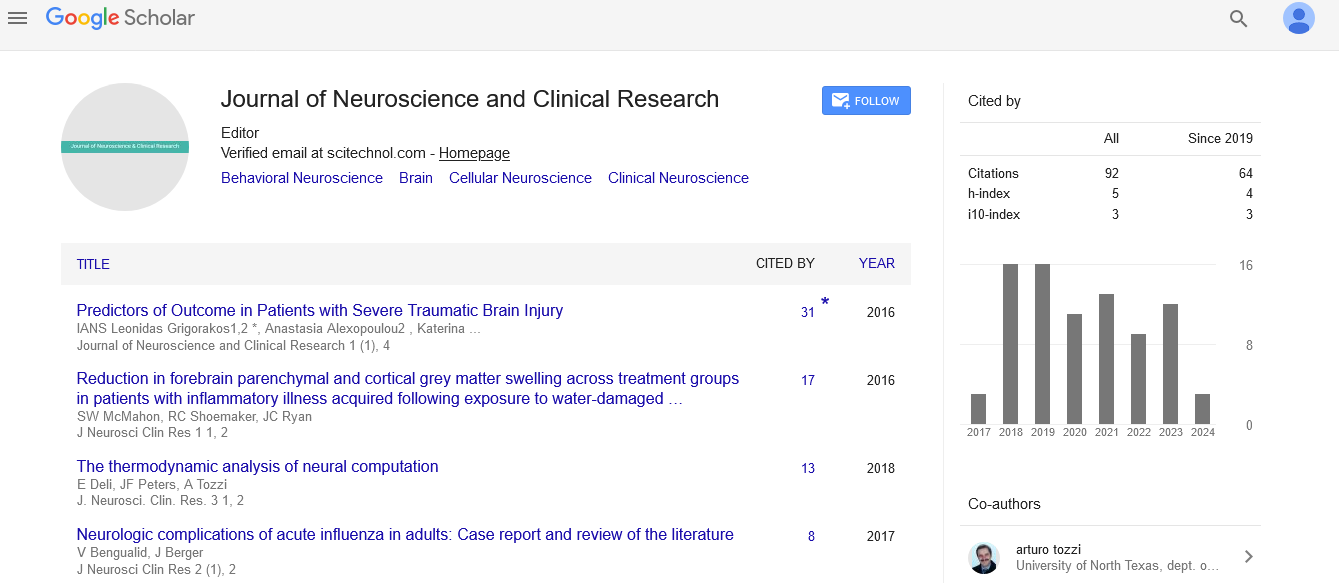Diagnosis and treatments of chronic alcoholic toxic cerebral encephalopathy: An expert consensus specialized committee professional board of brain and spinal cord injury, neurology branch of Chinese medical doctor association
Ying Peng
Sun Yat-Sen Memorial Hospital-Sun Yat-Sen University, China
: J Neurosci Clin Res
Abstract
Chronic alcoholism encephalopathy is a common disease existing all over the world, which is an important symptom of alcohol abuse and alcoholism. In order to promote neurologists’ understanding, popularize the standardized diagnosis and treatment of chronic alcoholism encephalopathy, we have made extensive discussion to reach the following consensus on the principles related to the clinical diagnosis and treatment on chronic alcoholism encephalopathy. Definition of chronic alcoholic encephalopathy: Chronic alcoholism encephalopathy is a chronic and recrudescent brain disease caused by alcohol acting on the brain tissue due to long-term drinking, that is to say, a seriously poisoning condition on the central nervous system caused by excessive drinking for a long time and almost all patients have dependently chronic pathogenesis of alcohol syndrome. Clinical manifestations and characteristics of chronically alcoholic encephalopathy: We divide chronic alcoholism encephalopathy into 6 kinds of syndrome according to the patient's clinical manifestation and the condition of onset and the duration of the disease, including Wernicke encephalopathy, Coxsackoff syndrome, chronic alcoholism dementia, alcoholic tremor-delirium, alcoholic epilepsy, alcoholically mental and behavioral disorders. Clinical diagnosis of chronic alcoholic encephalopathy: The coring symptoms/diagnostic criteria for alcohol dependence are described in DSM-4/ICD-10 as followings (3 or more of the following within 12 months): (1) Alcoholic tolerance; (2) interrupting symptoms/reactions after stopping drinking; (3) excessive intake; (4) beyond control and abstinence; (5) spending a lot of time seeking, acquiring and ingesting alcohol; (6) the intention of social communication is decreased; (7) regardless of any adverse consequences. The clinicians should be based on the above-mentioned diagnostic criteria, combined with the clinical manifestations and imaging characteristics for comprehensive judgment. Treatment of chronically alcoholic encephalopathy: Abstinence from alcohol: Currently first-line medicine includes Nalmefen, Naloxone, Dithiolam, Aconic acid and the second-line of medicine includes Baclofen, Topiramate, Benzodiazepines, tricyclic antidepressants, high-dose antioxidants. Others include etiological treatment, correction on nutritional disorders, brain-protecting therapy, rehabilitation therapy and others.
Recent Publications
1. Peng Y, Kwok KH, Yang PH (2005) Ascorbic acid inhibits ROS production, NF-kappa B activation and prevents ethanolinduced growth retardation and microencephaly. Neuropharmacology; 48(3): 426-434.
2. Peng Y, Yang PH, Ng SS (2004) Protection of Xenopus laevis embryos against alcohol-induced delayed gut maturation and growth retardation by peroxiredoxin 5 and catalase. J Mol Biol; 340(4): 819-827.
References
1. Guglielmo R, Martinotti G, Quatrale M (2015) Topiramate in alcohol use disorders: review and update. CNS Drugs; 29(5): 383-395.
2. Kalk NJ, Lingford-Hughes AR (2014) The clinical pharmacology of acamprosate. Br J Clin Pharmacol; 77(2): 315-323.
3. Soyka M, Friede M, Schnitker J (2016) Comparing nalmefene and naltrexone in alcohol dependence: are there any differences results from an indirect meta-analysis. Pharmacopsychiatry; 49(2): 66-75.
4. Li HH, He L, Qiu SW (2015) Clinical analysis in chronic alcoholic encephalopathy: a retrospective study of 43 subjects. Clinical Toxicology; 5(2): 1-4.
Biography
Ying Peng has obtained his Post-doctoral training in National Institutes of Health, USA (1997 to 2001). Presently he is working in Sun Yat-Sen Memorial Hospital, Sun Yat- Sen University as a Full Professor. His current research fields include addiction and toxic encephalopathy, gene therapy of neurological disease, cerebral ischemic stroke and brain injure and neural regeneration. He has published 105 papers in SCI journals. Additionally, he got the Fellows Award for Research Excellence 2001, sponsored by National Institutes of Health of USA and the Second Prize for Scientific Technique Progress Award of Guangdong Province in China in 1998 and 2014 respectively.
E-mail: docpengy123@163.com
 Spanish
Spanish  Chinese
Chinese  Russian
Russian  German
German  French
French  Japanese
Japanese  Portuguese
Portuguese  Hindi
Hindi 